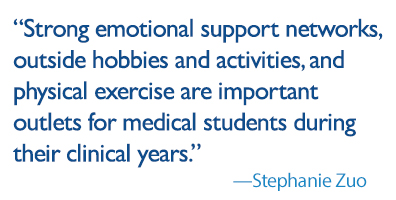Countless big and small tragedies occur in the hospital daily. There is the yearning for fresh air, the tedium of one blood draw after another, the inability to defecate, the removal of an organ, the loss of a child or parent. These are interwoven with beautiful miracles, human triumphs, cures and compassion. It is no wonder that as medical students, we find ourselves drawn into the quilt of it all.
Talking with several of my classmates, I was not surprised to find that each one could recall multiple events they had witnessed in the hospital that broke their hearts. In the same way, the suffering that I have seen firsthand in the hospital is firmly imprinted in my memory.
Sydur Rahman, a fourth-year medical student, vividly recalled his experience of a tragic death in the hospital. As part of the code team in the pediatric Emergency Department, he did chest compressions on a toddler, but ultimately, she passed away from her injuries. “That very night, I met up with some friends because I didn’t want to be alone. It was what I did to cope,” he said. By surrounding himself with friends and family, Rahman found the emotional strength to keep going.
Alison Kraemer, a third-year medical student, discovered that engaging with her team provided another way to reflect on difficult situations. She asks important questions, such as, “How would you break this sort of news to a patient’s loved one?” that have allowed her to grow from these experiences.
Strong emotional support networks, outside hobbies and activities, and physical exercise are important outlets for medical students during their clinical years. Still, making sense of human suffering is a difficult task. Judith Vick, a third-year medical student, finds a way to honor the patients whose suffering she has witnessed “through honoring them as teachers.” When Vick studies pathophysiology, she often recalls certain patients who she has cared for in the hospital. These connections allow her to remember medical knowledge that must be mastered, which “makes meaningful their suffering, in an abstract way, for future patients.”
For me, I find that writing creatively allows me to express myself and honor the suffering I witness. This is a poem I wrote after my first experience with a patient’s death in the hospital.
MED 5B CODE BLUE
I look down at my hands “good compressions” said the machine
see them pressing at the chest
of a man that I had never met
the clock ticking time
“intubate”
His feet bounce in their black Nike sneakers
as I lean my weight into my palms
“we need a fingerstick”
the fem line is dry
“more hands on board”
the whole bed is moving with the noise
of the bottom of a boat “glucose 144”
scraping off a rocky shore
the monitor shows tumbling white globs of chicken
“he’s aspirated”
My hands are shaking
my eyes no longer on his eyes
The fem line quivers out of the thigh
as if to write a message
his lips are agape
still
“rhythm check in 10 seconds”
A breath in, all around, fifteen people packed in a room for one,
a moment of effortful stillness
it is half past two in the morning
nothing
and then the machine
“start chest compressions”
my hands back on his chest again
my eyes on his
staring unblinkingly at the starry sky
beyond the plaster ceiling.

Very touching. You are definitely blessed with multiple talents.
Before starting my day I stopped to read the the breathtaking poem above. I've been employed at JHU SOM for over 30 years and for the better part of those years I've worked around and directly with residents and students. I've always known that the tasks of the classroom work/studies were challenging in the daily lives of students, but reading this poem gave me a keener sense of the up and down emotional trauma students deal with. These young students are confronted with the daunting tasks of trying to succeed in their chosen fields of expertise while at the same time deal with the horrors of life, death and sickness of patients. Stephanie shines a bright and clear light of the student's emotional ride of the classroom and the sick bed. Kudos to her and as well her colleagues. Continue to hold up the banner of science and saving lives! Your beautiful minds and hearts are in the right place!!!
Comments are closed.